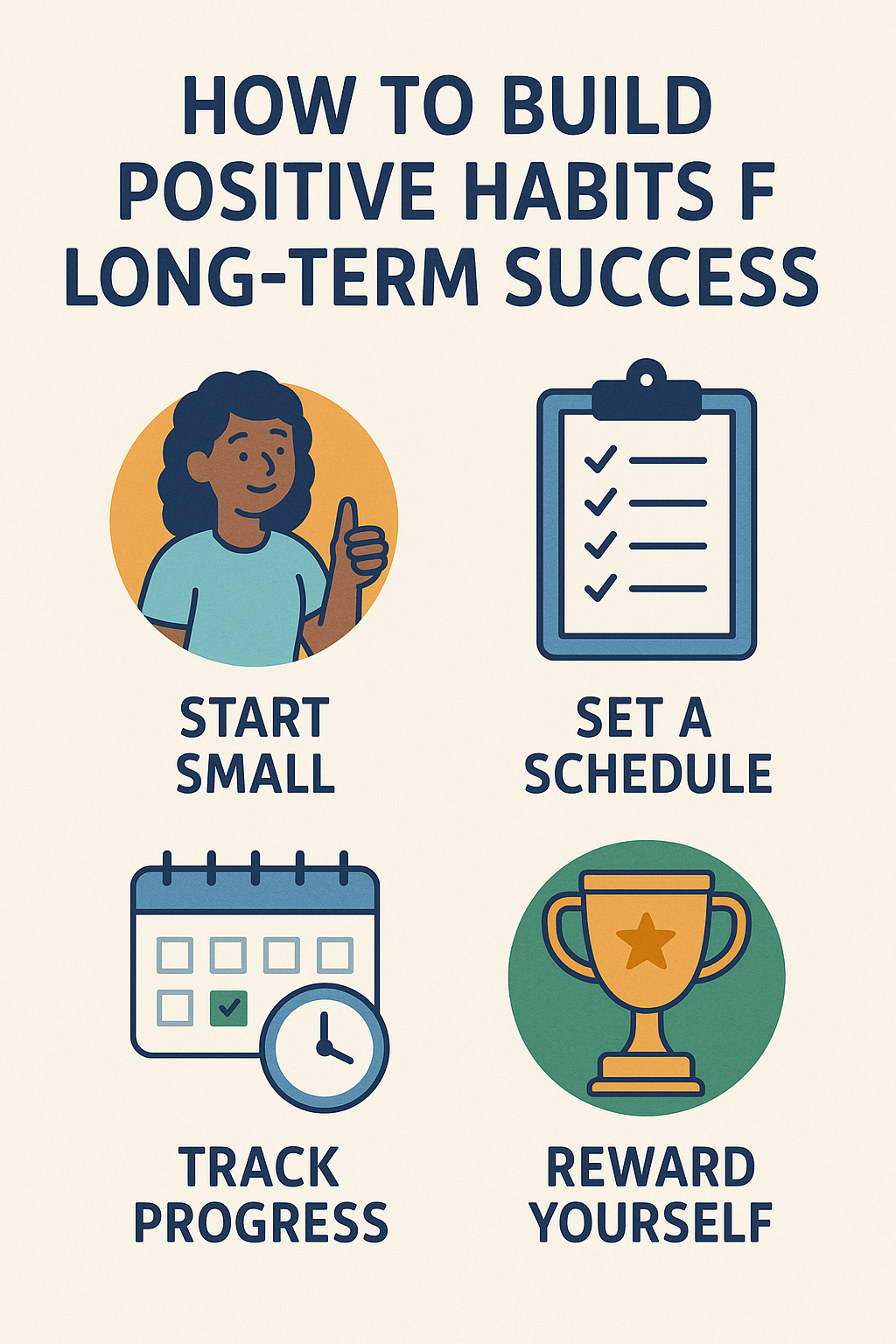Building positive habits is one of the most effective ways to achieve long-term success. Good habits create a foundation for consistent progress, helping you reach your goals without relying solely on willpower. Whether you’re aiming to improve your health, career, or personal life, cultivating positive habits is key. In this article, we’ll explore how to build positive habits and make them a lasting part of your life.
1. Start Small and Gradually Increase the Challenge
When building new habits, it’s important to start small. Trying to make drastic changes all at once can be overwhelming and lead to burnout. Instead, focus on incorporating small, manageable actions into your daily routine. As you build consistency, gradually increase the challenge to strengthen your habit.
Tip: Choose one small habit to focus on, such as drinking more water or exercising for 10 minutes each day. Once this becomes a part of your routine, you can build on it by gradually increasing the time or intensity.
2. Be Consistent, Not Perfect
Consistency is more important than perfection when it comes to building habits. It’s natural to slip up or miss a day, but the key is getting back on track. Don’t let a small mistake or missed day derail your progress. The more consistently you show up, the stronger your habit will become.
Tip: If you miss a day, don’t be hard on yourself. Just pick up where you left off and continue practicing the habit consistently. Over time, your commitment will pay off.
3. Make Your Habit Enjoyable
Positive habits are easier to stick with if they’re enjoyable. If you associate a habit with something you enjoy, you’ll be more motivated to continue. Find ways to make the process enjoyable so that it becomes something you look forward to, rather than a chore.
Tip: Pair your new habit with something you love. For example, if you’re trying to exercise more, listen to your favorite podcast or music while working out. This will make the habit more enjoyable and sustainable.
4. Use Triggers to Remind You
Habit triggers are cues that prompt you to perform a certain behavior. These triggers can be external (like a time of day or location) or internal (like a feeling or thought). By pairing your habit with an existing routine or trigger, you make it easier to remember and follow through on your new habit.
Tip: Attach your new habit to an existing routine. For example, if you want to start journaling, do it right after your morning coffee. This association makes it easier to remember and complete the habit each day.
5. Track Your Progress
Tracking your progress is an effective way to stay motivated and accountable. When you see how far you’ve come, it reinforces the positive behavior and gives you the encouragement to keep going. Progress tracking also helps you identify any challenges or areas for improvement.
Tip: Use a habit tracker app or a journal to mark off each day you complete your habit. Celebrate small victories and see how much you’ve accomplished over time.
6. Set Specific Goals and Milestones
Setting specific goals and milestones helps you stay focused and gives your habit-building process purpose. Rather than just saying “I want to exercise more,” set a concrete goal, like “I will work out three times a week.” This clarity makes it easier to stay motivated and measure your progress.
Tip: Break your larger goal into smaller, achievable milestones. For example, aim to work out for 10 minutes a day in the beginning, and gradually increase the time or frequency.
7. Surround Yourself with Positive Influences
Your environment plays a significant role in shaping your habits. Surrounding yourself with positive influences, whether it’s people, media, or physical surroundings, can help you stay motivated and reinforce the behaviors you want to cultivate.
Tip: Surround yourself with people who encourage your goals or are working on similar habits. If you’re trying to eat healthier, for example, find a support group or a friend to join you on your journey.
8. Practice Patience and Persistence
Building lasting habits takes time, so it’s important to practice patience and persistence. Don’t expect immediate results, and don’t get discouraged if you don’t see progress right away. Habits take time to form, and staying persistent will pay off in the long run.
Tip: Be patient with yourself and celebrate small milestones along the way. Remember, habits are built through consistent effort, not overnight success.
9. Eliminate Negative Habits That Hinder Your Progress
As you work on building positive habits, it’s equally important to identify and eliminate negative habits that might hinder your progress. Negative habits can drain your energy, reduce productivity, and make it harder to maintain your new habits. Identify these habits and replace them with healthier alternatives.
Tip: Take note of any negative habits that are interfering with your goals (e.g., procrastination, unhealthy eating) and work on replacing them with positive alternatives. For instance, replace watching TV for hours with a 30-minute walk.
10. Stay Flexible and Adjust When Necessary
Life is unpredictable, and sometimes your habits may need to be adjusted based on new circumstances. Flexibility is important to ensure that your habits remain realistic and sustainable over time. Don’t be afraid to tweak your habits if something isn’t working for you.
Tip: If you find that your habit isn’t fitting into your schedule or isn’t providing the results you expected, reassess and make adjustments. This will help you stay on track and committed to your long-term success.
